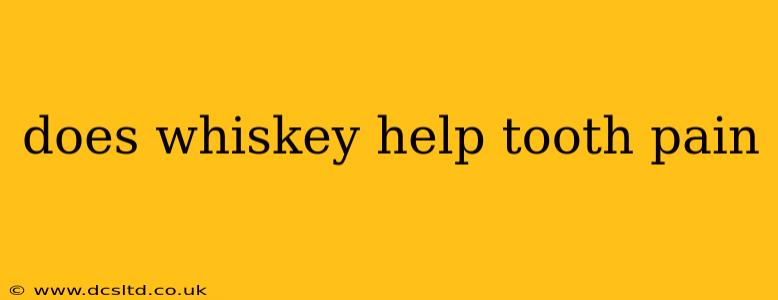Tooth pain is excruciating, and when it strikes, you might find yourself desperately seeking relief. Some home remedies are touted for their pain-relieving properties, and whiskey is one that occasionally pops up. But does whiskey actually help tooth pain, or is it just an old wives' tale? The answer is nuanced, and it’s crucial to understand both the potential benefits and the serious drawbacks before considering this approach.
Is There Any Truth to Whiskey's Pain-Relieving Properties?
The purported pain relief from whiskey stems from its alcohol content. Alcohol has a numbing effect when applied topically, meaning it can temporarily desensitize the area, providing a slight reduction in pain. This effect is similar to that of other topical anesthetics, though significantly milder. However, it's crucial to remember this is a temporary and superficial effect. It doesn't address the underlying cause of the toothache and offers minimal, if any, actual healing.
Why You Shouldn't Use Whiskey for Tooth Pain
While the numbing effect might seem appealing in the moment, using whiskey on a toothache carries significant risks that outweigh any perceived benefits.
Why is Alcohol a Poor Choice for Oral Health?
-
Infection Risk: An open wound or cavity creates an entry point for bacteria. Alcohol, while possibly slightly numbing, doesn't disinfect and might even impede healing, potentially increasing the risk of infection. A serious oral infection can lead to severe complications.
-
Dehydration: Alcohol is a diuretic, meaning it increases urination and can dehydrate you. Dehydration can worsen pain and hinder the body's natural healing processes.
-
Burning Sensation: While the initial effect might be numbing, the high alcohol content can also cause a burning sensation, potentially exacerbating the pain.
-
Irritation of Oral Tissues: The alcohol in whiskey can irritate and dry out the delicate tissues in your mouth, potentially leading to further discomfort and inflammation.
-
Delayed Treatment: Relying on a temporary fix like whiskey could delay you from seeking professional dental care, which is crucial for addressing the root cause of the toothache. Untreated tooth pain can lead to more serious and costly problems down the line, including abscesses and the potential loss of the tooth.
What Happens if I Swish Whiskey in My Mouth?
Swishing whiskey in your mouth carries the same risks as applying it directly to the affected area. The alcohol will irritate your gums and oral mucosa, possibly increasing pain and inflammation. It will not effectively address the underlying cause of your toothache and might even delay professional treatment.
What Should I Do Instead of Using Whiskey for Tooth Pain?
Instead of relying on questionable home remedies like whiskey, consult a dentist as soon as possible. They can properly diagnose the cause of your toothache and provide effective treatment. In the meantime, consider these safer options for temporary pain relief:
-
Over-the-counter pain relievers: Ibuprofen or acetaminophen can help manage pain and reduce inflammation. Always follow the dosage instructions on the packaging.
-
Cold compress: Applying a cold compress to the affected area can help numb the pain and reduce swelling.
-
Saltwater rinse: Rinsing your mouth with warm saltwater can help clean the area and soothe inflammation.
In Conclusion:
While whiskey might offer a fleeting moment of numbness, it's not a safe or effective treatment for tooth pain. The risks significantly outweigh the minimal benefits. Always prioritize professional dental care for toothaches to ensure proper diagnosis and treatment. Ignoring the pain and resorting to ineffective home remedies can only lead to more serious dental problems. Contact your dentist immediately for reliable and safe pain relief.
